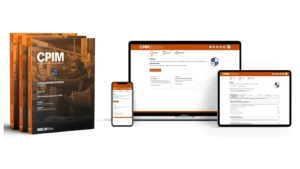
Get Certified in Planning and Inventory Management (CPIM)
Earn 23% more with a CPIM certification
Demonstrate your ability to optimize inventory levels, improve forecasting, and master scheduling tools.
Is the CPIM program right for you?
Resilience and agility are essential for supply chains to thrive. By earning the APICS Certified in Planning and Inventory Management (CPIM) designation, you gain valuable skills across all supply chain functions. In addition, you will be equipped to manage risks and disruptions. Moreover, the program helps you leverage technology to streamline processes and drive efficiency.
CPIM 8.1
- Supply Chains and Strategy
- Sales and Operations Planning
- Demand
- Supply
- Detailed Schedules
- Inventory
- Distribution
- Quality, Technology, and Continuous Improvement

The Learning System
The only exam prep system guaranteed to align with the current CPIM exam
Tip: Studying with the CPIM Learning System increases your chances of passing the exam. On average, we recommend 100 hours of study time.
The CPIM Learning System is the only prep program guaranteed to align with the current exam. For example, it offers both print and digital materials, interactive activities, and downloadable content. In addition, you benefit from:
- A personalized study plan based on your knowledge gaps
- Microlearning modules to save time and boost understanding
- Quizzes, flashcards, and videos that bring concepts to life
- A progress tracker to monitor performance
- Mobile-first design with 24/7 access on any device
The exam

Tip: Plan your exam date close to the time you finish preparing for the exam for better results.
To earn your CPIM designation, you must pass one exam covering eight modules. The exam consists of 150 questions and allows 3.5 hours for completion. As a result, candidates who score 300 or higher (out of 350) achieve certification.
CPIM exams are delivered at Pearson VUE test centers worldwide, or online through the OnVUE system.
Bundle and Save
A single purchase gets you all you need to earn your CPIM certifiction
The bundle includes a self-study learning system, one exam attempt, a second-chance exam option, and a one-year ASCM membership for those who are not already members. By purchasing this bundle, candidates can ensure maximum value and flexibility in their certification journey.

Date and time
Location
Bangladesh
Holding # 100/2, Building # 1-4 Block – B, Purbo Chandona Sofipur, Gazipur,, Dhaka NA
Refund Policy
About this event
Event lasts 147 days, 3 hours
Online session time: BDT 1 4:00 – 17:00
2, 9, 23 Dec 2025
6,13,20,27 Jan 2026
10, 24 Feb 2026
10, 17, 24. 31 Mar 2026
14, 21,28 Apr 2026
The course provides the necessary knowledge to manage all internal company activities required along the entire planning hierarchy, from Corporate Planning, Sales and Operations Planning.
The CPIM seminar covers all production and inventory management activities within the company’s “own four walls.” The course provides the necessary knowledge to manage all internal company activities required along the entire planning hierarchy, from Corporate Planning, Sales and Operations Planning, and Master Planning to Resource Planning and the implementation of the Production Plan. Furthermore, the course covers inventory management across all these planning levels.
The CPIM program consists of eight modules:
Module 1: Supply Chains and Strategy
- Supply chains, the environment, and strategy
- Strategic scope and objectives
- Developing and managing organizational strategy
- Functional and operational strategies
- Production environments, types, and layouts
- Performance monitoring and KPIs
- Risk management
- Capital equipment and facilities
- Sustainability strategies
Module 2: Sales and Operations Planning
- Purpose and process
- Aggregate demand and supply plans
- Reconciling S&OP plans
Module 3: Demand
- Demand management
- Sources of demand and forecasting
- Forecast performance
Module 4: Supply
- Creating and validating the master schedule
- Using and maintaining the master schedule
- Material requirements planning
- CRP and scheduling
- Suppliers and purchasing
- Product life cycle management
Module 5: Detailed Schedules
- Planning detailed schedules
- Scheduling and PAC methods
- Creating production and service schedules
- Managing materials and workflows
Module 6: Inventory
- Inventory planning
- Costs, value, and performance metrics
- Itemized inventory management
- Inventory control methods
Module 7: Distribution
- Planning distribution
- Replenishment and order management
- Waste hierarchy and reverse logistics
Module 8: Quality, Technology, and Continuous Improvement
- Quality management
- Technology applications
- Continuous improvement practices

